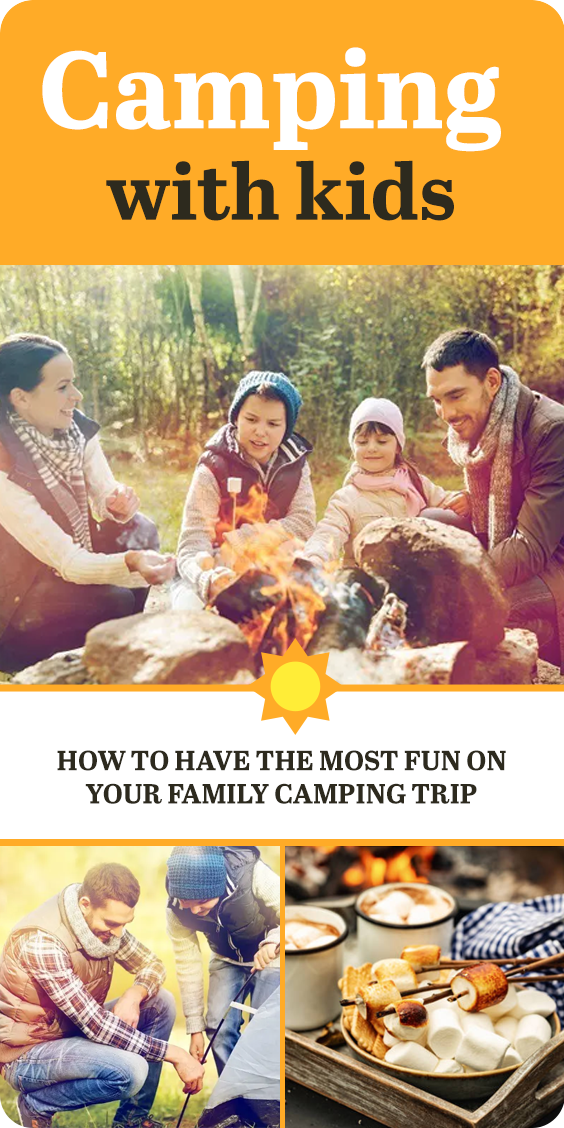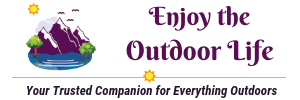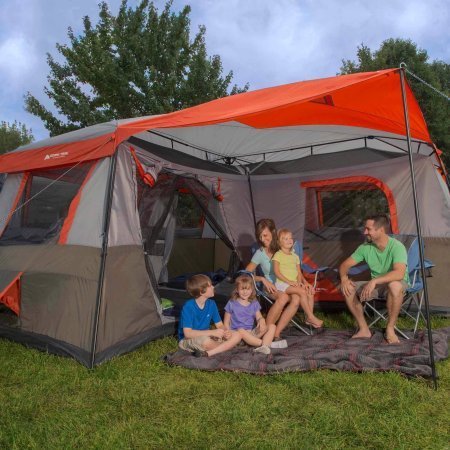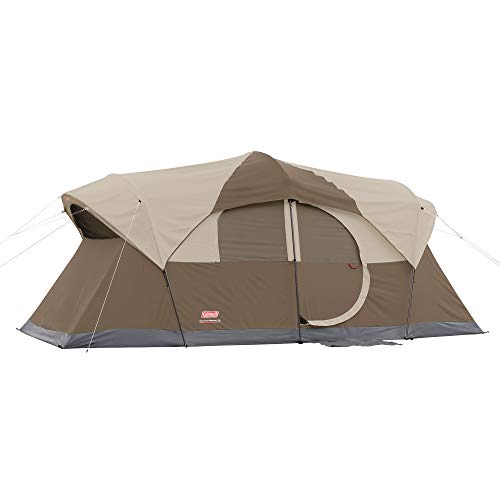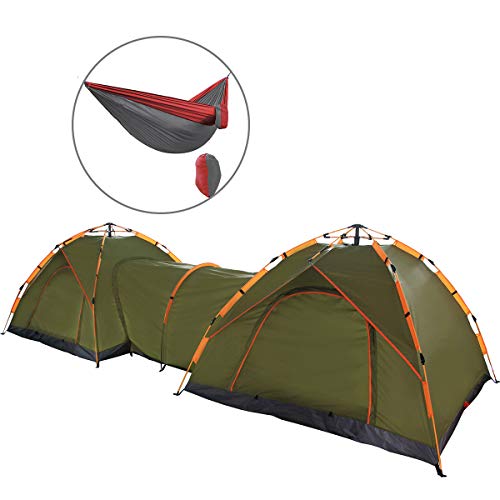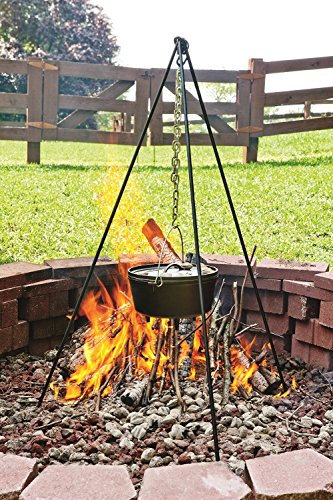Thinking of going on a family camping trip but worried it's too much work? With these tips, camping with kids will be easy, fun and create lifetime memories. In this post team member Judith shares useful information that will ensure you and your family have the best time ever — whether you're a first time camper yourself, or it's just the first time you've brought kids along!

“Time camping isn’t time spent, it’s invested.”
- Author Unknown -
If you are in your mid-20s, chances are that you are an outdoor addict (or were when you were that age).
You’ve probably enjoyed a few extreme sports, backpacked and trekked some trails, or simply set up a tent to enjoy the night sky and marvel at the great outdoors — living an adventurous life before starting a family.
But things change when kids come along, and lot adults take a break from participating in outdoor activities, including camping because "parenting" takes over.
As a mother myself, I can relate. There is so much to do with raising a family, that it’s easy to let some of our favorite passions slip to the wayside. Just like many other camping lovers, you may have convinced yourself that camping is costly, time consuming, and too much work with kids.
However, while such opinions might easily appear to be real to you, for avid campers, such excuses are normally considered to be unrealistic and untrue.
According to most of them, all that’s needed is good planning and a detailed understanding of what’s required, as well as information about how best to create a marvelous camping experience with your family.
Yes, you can enjoy the wonders of camping with kids!
Tips for Camping with Kids to Ensure Max Fun!
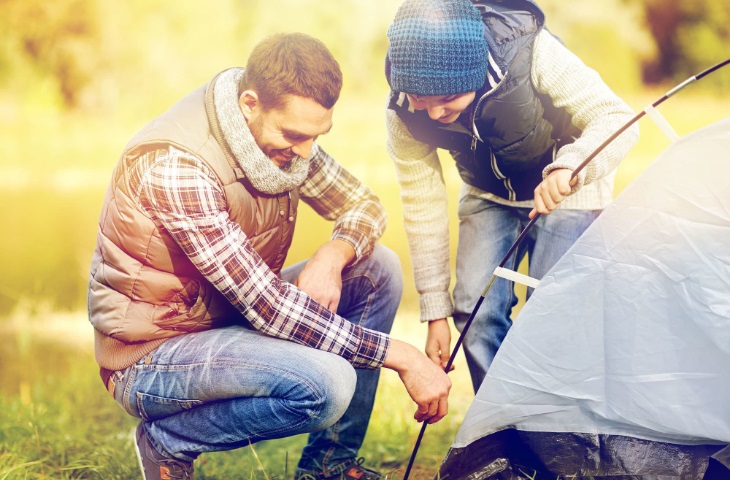
Camping provides wonderful opportunities for bonding and teaching life skills.
If you are one of those people who believes that camping with young children is more trouble than it's worth, it's time to bring the joy of family camping to your life — and create new, wonderful memories that will last a lifetime!
To get things started, here are some simple tips for camping with kids.
Pack Like a Pro
With the digital era upon us, getting detailed information of what to pack and what to leave out should be easy. All that’s needed is a few clicks and one or two phone calls to confirm what to carry and what to leave out.
When it was just you and your buddies, it was easier to “wing it” and if you forgot something, you managed. But with children, it does take a bit more planning. For example, if you have a young child who is just starting to be potty-trained, they may be hesitant to “go” outside. This means you will need to pack their potty.
While you should always pack a first aid kit, it’s even more important with children. Make sure that you include Benadryl in case there are any bug bites or unexpected allergic reactions.
And make sure you have an emergency contact list with you (not just on your phone!).
Plus, never leave out items that your loved ones say they can never live without. For example, if your daughter loves to sleep next to her favorite doll or your young boy loves sleeping close to his sound machine for example, make sure that you include such items in your camping with kids checklist (I share my must pack list below).
Video: How To Pack Your Food For Your Camping Trip
Now this guy has packing food down to a science! | Courtesy of Nick Pelletier
Know Your Tent
On thing you need to do ahead of time is ensure your tent is big enough and is able to accommodate everyone. If it is your first family camping trip (or if it’s a brand-new tent), I recommend to first set it up at home to make sure the size is right, and that all the pieces are there.
Another reason for pitching your tent at home is so you know how to put it all together. This will make the process at the campsite go a lot smoother, which is especially important with young kids around.
If your kids have never been camping before, spend a night as a family together in the tent in your backyard. This will give them a small taste of what it will be like and will also give you an idea of how your younger kids will react to sleeping outdoors.
By the way, backyard camping is a super fun, and cheap family activity! The added benefit is that if something does go wrong, you are only a few steps from home.
Video: Backyard Camping Ideas for the Whole Family
Grab the kids and explore the wilderness of your backyard with these fun tips. | Courtesy of HGTV
Another thing you will have to decide is whether you want one big tent for the entire family, or if you have older kids and teens, whether you want to set up two or more mid-sized tents.
If there's a super loud snorer (or really light sleeper) you may want to that person their own one-person tent!
Camping is one of those activities that will keep you away from all the technology and stuff that, as much as it helps us, can also keep us separate from each other. Even something as simple as telling folk tales and talking around the ol’ campfire, can strengthen family bonds.
But after a couple of camping trips, you’ll realize that the key to a good experience depends on just how comfortable everyone is.
You can find all of this in a reliable camping tent for families.
The best family camping tents in the modern day are structured around convenience. They are easy to set up, yet large enough to fit the entire family. We are talking large enough to fit in small chairs and still move around. The tents are made using lightweight material and are also nicely compact for easy transport.
If you want to take the whole family out, consider one of these tents with plenty of space for everyone!
Best Family Camping Tents 2020 — Our Picks
NOTE: chart shows Amazon prices from high to low at the time of our research. Since prices frequently change, the order may not be exact when you view it.
Amazon.com prices as of 4/26/2020, 9:14:50 AM - details
Have an Alternate Shelter Plan in Your Speed-Dial
If you are using a tent, before heading out to the campground, do some research on what other options are available in the area such as cabins or nearby hotels. This way, if the weather is miserable, or one of your youngsters REALLY doesn’t like sleeping outside overnight, you have a back up plan and your whole trip isn’t ruined. You can return to the campsite during the day, or when the weather clears.
If you are not fully convinced that tent camping is the best option for your family, look for a cabin rental and weigh your options. Many campgrounds and national parks normally have basic cabins, yurts and primitive shelters in place for campers who prefer those options.
By simply calling them, you can get details and if you’re close enough, you can physically inspect the alternatives before picking an option that meets your specific need.
There are also companies like RV Share that make it possible to rent camping RVs in destinations all over the country.
RVs are a great choice if you have really young children or want a bit of modern convenience. Depending upon where you are, you can either have one delivered right to your door, or you can drive to the destination.
Renting an RV is also the perfect choice if you are planning a road trip to visit different locations or national parks. Instead of having to set up your tent at every new destination, just pull right up. It’s also great for more spontaneous adventures, because you always have a place to sleep.
Want to keep costs down?
If you have a pickup truck, minivan or hatchback with removable seats, camping in your car is a good way to go. Basically, one or two sleeping bags and a string of lights can easily turn your family vehicle into something magical.
Have Enough Lights
Nighttime in your campground can be far darker and frightening than what you and your loved ones expected. Thus, to avoid ruining the adventure, ensure that you use a string of lights or lanterns to create ambient lighting.
Break out some of your Christmas lights packed away in storage or get some special ones for the trip. Lights hung in trees around the camp sight creates a wonderful atmosphere. You may also want to hang some along the front entrance of the tent, cabin or RV door, to make it easy to find in the dark.
If are camping in a tent, you also want to make sure you have some soft lighting in place inside. Not only do many young children require a nightlight while camping, but it will also be useful for those middle of the night diaper changes and feedings. It will also help with moving around when the little ones have gone to sleep.
Here's another great idea — bring glow sticks or glowing necklaces and bracelets.
Not only will the kids have a blast with them, but you'll always be able to see where they are! You can get a bulk pack of 400 connectable party glow sticks for under $25!
You may even want to consider glow in the dark tent pegs or glow in the dark tape to mark off areas to make them easy to see at night. This roll of tape even comes with glow in the dark stars and dots that your kids can use to decorate the camp site.
Be Aware of the Fire
Take time to educate your children about fire safety BEFORE the trip. With all the excitement, especially if it’s their first time camping, most children are fascinated by the flickering flames of the fire. Set up a campfire in your yard to let them see what it’s like. If you don’t have the space, a cheap alcohol stove is a good way to teach your children about the benefits and dangers of fire.
While it is natural for your kids to try and be close to the campfire; especially if you’re grilling steaks and burgers, and its appealing to the eye, it’s important to keep them from getting too close. At the campsite, ensure everyone has his own camp chair and sits a safe distance from the campfire.
A simple way of doing this is to draw a ‘fire line’ in the dirt around the campfire and ensure that they do not cross it. For curious crawlers, simply keep them in a playpen or carrier. Or put a baby gate around the fire — just make sure it’s far enough the fire so that it doesn’t melt or catch on fire.
When roasting marshmallows, make sure to use sticks or branches from fresh trees, not ones that are dried up on the ground. This will help to prevent them from catching on fire. And of course, make sure they are long enough so your kids are not standing too close.
Another Real Mom shares practical tips she learned on her 1st family camping trip.
10 Tips for Camping with Kids | Courtesy of Kate Bridge
Bring the Snacks
Most kids tend to get cranky when they are hungry, and yours are no exception. And with all the energy they will be expending, it’s likely they will have more of an appetite than usual.
On top of that, cooking meals on a campfire tends to take longer and young children may not have the patience to wait for the yummy grilled goodness.
Thus, to avoid hunger meltdowns, pack lots of snacks to hold them over, and for in between meals. A rule of the thumb here is to simply pack far more snacks than what you think you actually need. From protein bars to fruit pouches and crackers, carry anything and everything that does not need to be refrigerated.
And most importantly, make sure you have lots of drinks so your kids say hydrated!
Just boxes work great — you can freeze them in advance and they stack nicely in a cooler.
Be Realistic about Dirt
When heading out, ensure that you lower your expectations of cleanliness. This is one of those times when getting dirty is a big part of the fun.
If it’s your first time to go camping with your kids, be ready to see them roll around in dirt like wild little beasties. If you are used to such scenes, then you probably know that it is always a good idea to carry one or two packs of wipes.
Foaming hand sanitizer should also be in your list of things to carry especially if your campsite does not have running water. You will also want to pack some washcloths and soap for the dirtier messes.
Learn and Teach Some Survival Basics
Camping provides quality family time and fun, but it can also provide the opportunity for teaching experiences (without the kids realizing they are learning).
Having an idea of what to do when out in the woods is always a good idea. If you’re an avid camper, this will be old hat for you. Now it’s time to share that information with the youngsters.
Things like knowing how to build a campfire, how to set up a camping tent, how to identify plants that are safe to eat or poisonous (either to eat or touch), and most importantly, how to sanitize and dress a fresh wound, are at the top of the list — especially when camping with your kids.
If you are a first-time camper yourself, make sure to do a bit of research beforehand so you avoid being caught off-guard. Remember, there’s a lot less "winging it" with kids involved!
Take a look at this post if you want to learn how to make your own camp stove.
Video: 9 Easy Campfire Meals Kids Will Love!
Love the different S'more variations! I'll be trying that berry cobbler for sure. | Courtesy of BuzzFeed Nifty
NOTE: Personally, to keep things simple I use pre-made pancake mix and pizza dough (my easy meal ideas for camping with kids are further down).
Make Sure to Have as Much Fun as Possible
Once you get away from their regular world, some children adapt quickly to nature and are able to entertain themselves. But even the most adventurous kids, may get bored without their tech (which I recommend leaving behind) and will probably start asking for fun things to do.
You need to be prepared for this, to avoid ruining the whole camping adventure because the kids are not enjoying themselves. Or worse yet, having to cut the camping trip short.
Plan appropriately, especially if you have babies and toddlers that are not old enough to explore on their own. Pack dirt friendly toys, including some of their favorites. But also get some that are “special and new” for the surprise factor. Something as simple as a shovel and pail set can be tons of fun. Remember, I said to be prepared for the dirt?
Other ideas include bug collecting kits, binoculars, a magnifying glass and books for identifying leaves, plants or animal tracks. I also recommend getting a kid’s camping journal, so they can record their adventures and findings. This will be something they can look back on with fond memories.
Speaking of memories, don’t forget to take lots of pictures and videos of all the fun you are having. If you don’t have a digital camera, you can get a decent one for not a lot of money.
Why a digital camera when you could just use your phone?
You want to avoid the slipping back into hold habits like checking social media and emails, or the kids wanting to play their games. Not to mention the fact that if you are camping in a place without electricity, you want to save your battery for emergencies.
Forget the world you left behind and enjoy the time with your family. You can always post the pictures when you get home!
Some digital cameras today, even have the ability to post directly to social media if really you can’t wait. For example, if you want to capture lots of action, GoPro is the way to go. Or, if you want something less expensive that you don't have to worry about breaking or losing, Akaso makes a best selling wi-fi compatible HD action camera that sells for about 60 bucks.
Do’s and Don’ts for Camping with Kids
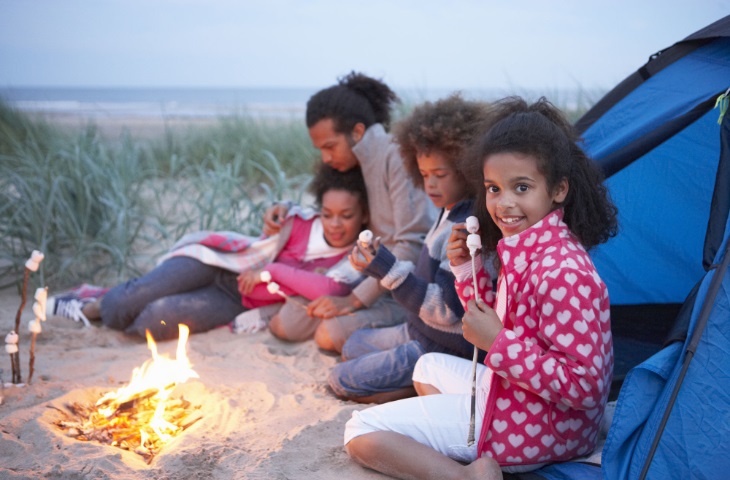
One definite "Do" — Bring the marshmallows (and Don't forget the chocolate!)
Now that you have an idea of how to go about camping with children, the next thing you need know is some simple "rules" for when you are out there.
Basically, knowing what to do and what not to do when camping plays a critical role in ensuring that you make the right decision —bearing in mind that such decisions normally require quick thinking.
Here are a few do’s and don’ts which you should always keep in mind.
Family Camping Do's & Don'ts
DO Inform Someone You Trust Before You Go Camping
Before heading out, make sure that you inform someone of your planned trip.
Give details of where you are heading and for how long you plan to be there. In addition, provide clear details of how you can be reached in case of an emergency.
If you are heading out to a site which does not have a phone or internet coverage, provide details of your location and the nearest emergency stations like the police station and fire department.
DO Be Cooperative and Social
When you were younger, you might have been of one of those people who preferred solo camping and loved the sense of isolation away from the rest of the world. But for most people, especially family campers, one of the major draws for camping is the sense of community.
There is just something magical about it. Total strangers, mixing and mingling, sharing food and stories over the campfire. So, even if you are a person who hates mixing with other people, try bringing out your social side — and role model cooperative behavior for your kids.
Camping requires teamwork and thus you must be ready to make it work. When the adults are busy doing things like setting up the tent or cooking meals, give the kids a job to do. This not only will keep them busy, but it also provides them a sense of pride in knowing they helped. Some good tasks for kids include helping to clear the campsite, gathering twigs, branches and logs for the fire, or helping to unpack.
If you are heading to an isolated location, consider letting your kids invite friends.
DO Enjoy Lots of Activities
Yes, one of the major benefits of camping is having time to relax, away from the hustle and bustle of everyday life. But don’t just sit around the fire all day.
When you are at the campsite, you should take advantage of what nature has to offer. On top of that, many campgrounds offer attractions like swimming pools, paddle boats, miniature golf, bicycler rentals, and even water slides. Some also arrange special events such as bingo, movies under the stars, dances, ice cream socials and theme nights.
Make sure to join in on the festivities.
Try out swimming, biking, hiking or simply playing a soccer match with the other people who have accompanied you in your adventure. Such moments will not only bring you closer to your loved ones but will also ensure you become healthy and mentally fit.
DO Prepare and Store Your Food Properly
If you are planning to spend a few days out, make sure that you pack your food in good quality containers. This includes both perishables in coolers and dry goods in sealed containers or bags. First of all, the moisture in the air can cause foods to turn "less desirable" (who likes soggy chips?) or go completely bad in the case of things like meats and dairy products.
But more importantly, animals have a keen sense of smell and the last thing you want is raccoons, squirrels and possums ransacking your goodies. Or worse yet, attracting the attention of a not-so-friendly "Yogi" the bear.
If you are planning to go camping with kids, ensure that you have all the camping with kids essentials before heading out. This includes a breast pump for breastfeeding babies.
DON’T Leave Any Food Unattended
Your campsite should always be tidied up before you go to sleep or go hiking. And don't forget a secure container for the food trash. It absolutely has to lock in the smell!
Unlike in the past, many campsites nowadays usually have camp rangers on standby who have been trained to assist campers around the site. Thus, you can easily ask one about proper food safety in order to avoid unplanned animal encounters.
DON’T Destroy the Campsite
It is advisable to always be mindful of your eco-footprint. A basic rule of thumb here is to always try and leave with everything you came with; especially trash.
If you are camping in national parks, make sure you know their rules for things like open fires and picking wildlife.
In addition, you should always try and collect any litter left behind by other campers who are less considerate. Such actions will go a long way in ensuring the site you loved remains in good order for generations to come.
Camping Checklist - What to Bring on Your Family Camping Trip
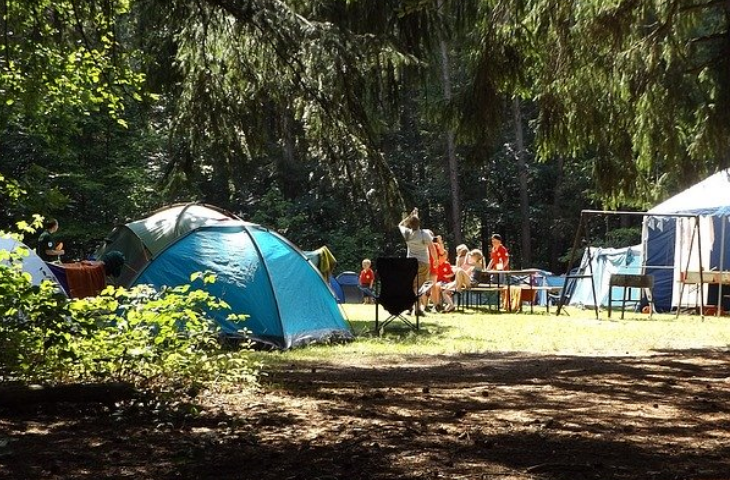
To get the most out of your trip, do your best to keep packing simply. The last thing you want to do is get stressed out before you even hit the road!
It goes without saying that when kids are involved with camping, the list of things you need to bring along goes up. I’ve seen lists like this one with over 100 items on it.
Ouch! No wonder so many parents give up camping until their children are older.
Now mind you, some of the things on many camping checklists are obvious. Thinks like tents, sleeping bags, cooking gear, coolers, clothes that can be layered, raincoats/jackets, appropriate footwear and toiletries.
And if you have babies or toddlers, of course you are going to need either a portable crib or playpen, bottles and age-appropriate foods.
Besides those obvious things, what you need to bring camping will greatly depend upon how long your trip will be, the ages of your children and how far away you will be from civilization (aka the dreaded “oh, no we forgot….”).
What should I bring when I go camping with kids?
Basically, there are two types of family campers:
- those that bring everything including a portable kitchen sink, just in case they "might" need it, and
- those that bring just the essentials and enjoy the idea of roughing it.
My family leans towards the second group, and we pack just what we need.
But if you've never been camping before, how do you know what the “essentials” are?
In order to keep things simple, I’ve put together a list of things you should bring with you camping, that you may not have thought of (especially if you are a first-time camper).
Earlier in this article I mentioned the importance of bringing hanging lights, glow in the dark accessories, wet wipes, a first aid kit and a baby gate if you have little crawlers.
You should also pack the following items:
In addition to these more "universal" camping gear items, you are also going to want to pack things that are relevant to the personal needs and plans of your family.
For example, you may want to include fishing and hiking gear, a ball and glove, or a game of horse shoes.
Camping hammocks are nice to have too for relaxing or sleeping under the night sky!
To avoid the last minute rush, set aside some time with your family to talk about what you want to bring and create your own list.
Each person can be responsible for collecting certain items, putting them in a designated location and marking it off the checklist.
Video: How To (Easily) Pack When Camping with Kids!
I LOVE how she keeps it simple and packs in under an hour! | Courtesy of Natalie Hodson
Easy Family Camping Meals
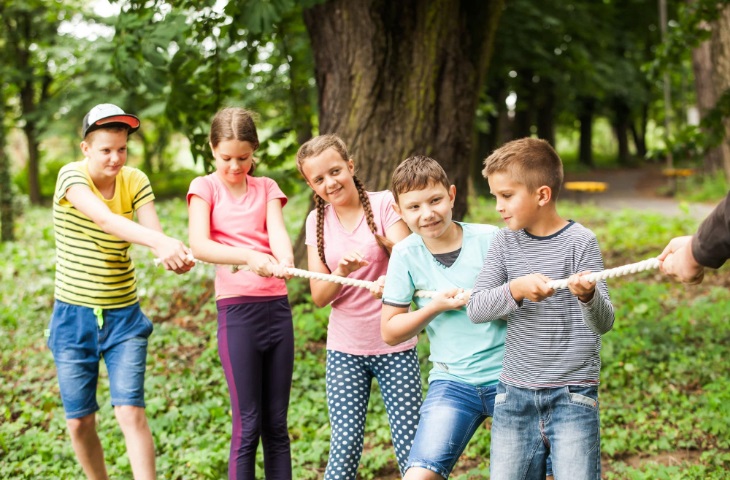
Kids burn up lots of energy playing when camping, so you want quick, easy meals to refuel them for more!
I hope the information I have shared so far has been useful. But before I leave you, there's one topic I haven't really covered much — and that's what to cook when camping with kids.
For our family, when we go camping we like to keep things simple when it comes to cooking. Hey, this is a vacation for mom too! I have friends who plan special meals, but for us we stick to what I guess you would call "classic barbecue foods."
If this is your first time camping with kids, especially if they are young, sticking to the basics not only makes things easier, but it also frees up your time to do other fun stuff!
Some examples of easy, kid-friendly camping meals include:
- Hamburgers and hot dogs
- Chicken and ribs (with barbecue sauce of course)
- London broil and/or steaks
- Corn on the cob (can you say mmmm at grilling it!)
- Potatoes (you can do so much with them, including baking them in foil)
- Fresh veggies (cooked in foil or in camp skillet)
- Eggs, milk, butter and cheeses
- Pancake mix and syrup (make your own or use pre-made)
- Frozen pizza dough for campfire pizzas
- Biscuits and cinnamon rolls that come in those "pop n' open" containers (these come out great cooked in a cast iron skillet over lower flame)
- Small containers of condiments and spices
- Popcorn (use Jiffy Pop with an extension handle or a campfire popcorn pan)
- Sun tea (we start this in the morning and it's ready for the afternoon meal)
Recommendation for Making the Best Campfire Meals
Invest in at least one cast iron skillet that is designated for camping.
As you probably know, you don't wash cast iron the way you do a regular pot, so you don't want to use you good one because of the flames and soot. You will be able to use this pan at home on the grill, so it can serve more uses than just cooking meals while camping.
We also make sure to pack bread, canned and dried goods.
We bring these not just because they don't require refrigeration but also because there are times when we want a fast meal that doesn't require firing up the grill. A quick tuna fish or peanut butter and jelly sandwich and you are ready to head off on your adventures for the day. We also bring protein bars to take with us when we are away from the campsite on hikes and what not.
And of course, we bring all the fixings to make S'mores. I mean, who doesn't love them?
Two other things that make life at the campsite easier are pre-packaging your foods by meals, and doing some of the preparation at home.
Unless you own or are renting a decent sized RV, you are not going to have a lot of space — either for storage or for the actual cooking. Whenever possible, transfer foods that are in large containers in to smaller ones, and only bring as much as you will use.
Trust me, you will hear more stories of people who brought too much food with them than not enough!
For things like condiments, I recommend buying the smaller self-dispensing plastic bottles. They cost a little more comparatively than buying in bulk, but the convenience factor alone is worth it. Not to mention the space it will save.
And don't forget to pack ziplock bags (gee, I have certainly mentioned them a lot) and aluminum foil — these are two of your best friends when camping.
In terms of make ahead foods, one thing I do for the first night is put all the ingredients for a pot of chili together in a sealed container. Then, we throw it on the fire (a hanging cast iron dutch oven works fantastic for this) and let it cook while we are setting up camp.
Or sometimes I do the same thing with the ingredients for beef stew.
Both of these require little attention other than stirring once in a while. And they make for a wonderful, hearty meal after all the hard work!
Basically, most of your favorite "make ahead meals" will work well for easy camping meals.
Video: Easy Make Ahead Camping Freezer Meals
Make at home & freeze. Toss in cooler. Thaw & cook. Dinner is done! | Courtesy of Better Meal Plans
One thing we don't pack is any kind of fish — we love catching and cooking our own!
If your kids have never tried fish before, camping provides the perfect opportunity. For starters, this particular option will help you teach your kids one valuable lesson, that good things come to those who wait. Plus they get the fun of fishing for supper!
Basically, once you catch the fish, you will be required to fillet and debone it, and this will take some time. The good thing here is the fact that your kids will love being part of this process since they get to see how their dinner is prepared right from the start.
Important Tip for Packing Food for Camping
If you will be camping for more than a few days and won't have access to actual refrigeration, invest in a really high quality cooler like one from Yeti, Grizzly, K2 Summit or Pelican (and use dry ice, at least to start). They cost more but the money you will save by preventing food from spoiling is well worth it.
Plus you can use the cooler for more than just camping!
Video: Easy Make Ahead Camping Breakfasts!
Yummy make ahead breakfast burritos for camping. | Courtesy of Better Meal Plans
A Few Final Words...
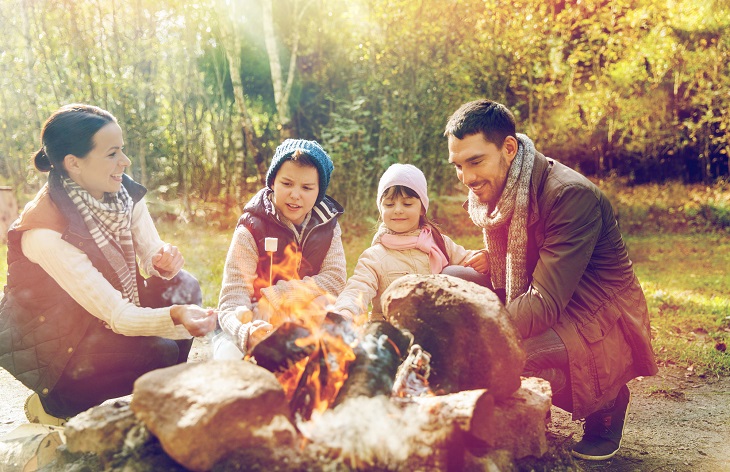

The rite of passage of learning to build a fire that will burn all night with one match is not an insignificant one in my husband’s family, and I grew up camping and backpacking. I love to camp.”
- Sarah Wayne Callies -
So, you’ve finally got some time off from work? Why not go camping with your family?
As my families (both young and old) will tell you, camping is a great way to not only teach basic life skills to your kids but also to bond with them and share the love.
Generally, for you to have a positive camping experience, you must do some planning ahead (unless it's a spontaneous backyard camping trip) and at the same time weigh all your options.
Whether it is your first time or not, great planning will always lead to attaining a great camping experience.
So what are you waiting for? Take your kids camping and create memories that will last a lifetime!
